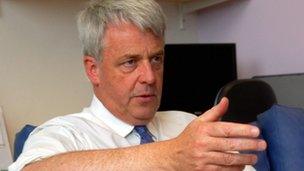No common leader
- Published
- comments
So. Farewell then, Sir George Young. The bicycling baronet has a ministerial career stretching back to the early 1980s, including a spell as Transport Secretary under John Major.
His Indian summer as Leader of the Commons has come to an end, but not before he left a real mark on the House. It was Sir George who put the first tranche of the Wright reforms to the working of the Commons into action.
So he deserves a good share of the credit for the strengthened select committee system and the backbench debates which have made such a difference to the Commons. As a backbencher, Sir George was a member of the Wright committee, which was set up to restore the credibility of the Commons in the wake of the expenses scandal.
And when he was recalled to the front bench, he and his future deputy, David Heath, campaigned vigorously with to ensure the Brown government went as far as possible in committing to implement the reforms (veteran readers will recall that there was a bit of an awkward pause before the then Leader of the House, Harriet Harman, announced that MPs would be given a chance to vote on the reform package).

Will Mr Lansley continue Sir George's reforms?
His successor is Andrew Lansley, the former Health Secretary - who, so far as I can discover, has not expressed any views on Commons reform, for or against. He didn't vote on the proposals for a backbench business committee or for elections to select committees, in the debate in the last parliament, on 4 March 2010. Mr Lansley's attitude matters because the Commons is supposed to continue the reforms by setting up a House Business Committee, which would control its entire agenda - and ending the bizarre state of affairs where it is determined by the government rather than by MPs.
The aim of the change is to get better scrutiny the activities of government and, in particular, of new laws.
This is not the sort of change which commends itself to government business managers. Typically, they want their legislation pushed through with minimum fuss. It's a rare minister who acknowledges, like Jack Straw, that debate and scrutiny can improve their bills. The House Business Committee could, for example, insist on sufficient time for the whole House to debate changes made to bills at committee stage, which can be very extensive, and which, all too frequently, were simply rubber stamped in absurdly short debates at report stage. To his eternal credit, Sir George has ensured that report stage debates were not as perfunctory as they often were under the previous government. I would not be at all surprised if he joined the chorus of senior backbenchers urging the government to push ahead with a House Business Committee.
But even the most anodyne version of a House Business Committee needs the support of a strong Leader of the Commons. The question now is whether Mr Lansley supports the reform in the first place, and whether he carries the clout to bring it in.